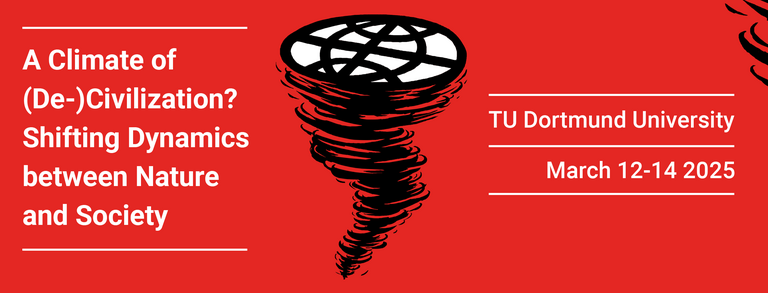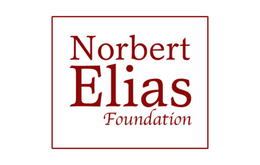A Climate of (De-)Civilization? Shifting Dynamics between Nature and Society
March 12-14, 2025, TU Dortmund University
Preliminary Programme
Wednesday, March 12
Location: Erich-Brost-Institut, Otto-Hahn-Str. 2, Dortmund, S1 Train Stop “Universität”
from 3.30 p.m. Arrival & Registration
4.00-5.00 p.m. Welcoming Addresses
A Climate of (De-)Civilization? – Process Sociology as a Thinking Toolbox for Understanding the Socio-Ecological Crisis
Bernd Sommer, TU Dortmund University
Opening Message
Adrian Jitschin, Norbert Elias Foundation
Opening Message
Tessa Flatten, Vice President International Affairs, TU Dortmund University
5.00-6.30 p.m. Keynote
Colonialism as European De-Civilisation: The Implications for Understanding Climate Catastrophe
Gurminder Bhambra, University of Sussex
Moderator: Marta Bucholc, University of Warsaw
from 6.30 p.m. Reception
Thursday, March 13
Location: Erich-Brost-Institut, Otto-Hahn-Str. 2, Dortmund, S1 Train Stop “Universität”
9.00-10.30 a.m. Panel “Civilising / De-Civilising Processes”
Chair: Debbie Kasper, Hiram College, Ohio
Tightened lines of conflict in the socio-ecological transformation? Mentalities and social structure in (de-)civilizing processes
Martin Fritz, Jana Holz & Philip Koch, Friedrich Schiller University Jena & Dennis Eversberg, Goethe University Frankfurt
The De-Civilisation of Progress – A Contribution on the New Figuration of Time in the Climate Crisis
Thore Prien, Europa-Universität Flensburg
Ecological collapse as de-civilization? Some reflections on Norbert Elias in the polycrisis
Matthias Schmelzer, Europa-Universität Flensburg
Break
11.00 a.m.-12.30 p.m. Panel “Violent Conflicts”
Chair: André Saramago, University of Coimbra
War and Environment: Ecological Crises and (De-)Civilisation in Ukraine and Gaza
Adele Bianco, D'Annunzio University of Chieti-Pescara
(Not) All is Fair in Love and War: Military Violence, Nature, and the concept of Ecocide in the Context of Norbert Elias' Theory of the Civilizing Process
Kerrin Langer, TU Dortmund University & Frank Reichherzer, Bundeswehr Centre of Military History and Social Sciences
The internal violence on nature in farmer-herder conflict in South-Western Nigeria
Abiodun Paul Afolabi, Adekunle Ajasin University
Lunch Break
1.30-2.30 p.m. Keynote
The Pitfalls of Transformation. On Precarious Figurations
Sighard Neckel, University of Hamburg
Moderator: Bernd Sommer, TU Dortmund University
2.30-4.00 p.m. Panel “Contested Futures”
Chair: Adrian Jitschin, Norbert Elias Foundation
Figurations of socio-ecological decline. Populist perspectives for a non-sustainable Germany.
Fritz Reusswig, Potsdam-Institute for Climate Impact Research (PIK)
Sympoietic Human/Non-Human Relations in Occupied Forests: Future-making Practices on a Damaged Planet
Alissa Starodub & Sebastian Garbe, University of Applied Sciences Fulda
In Praise of Decay, Toward a Politics of Compost
Jessie Croteau, Johns Hopkins University Baltimore
Break
4.30-6.00 p.m. Panel “Local (De-)Civilization”
Chair: Sarah von Querfurth, TU Dortmund University
Accepting the Maelstrom? Drought and the Involvement – Detachment Continuum
Marta Gospodarczyk, University of Warsaw
Ecosocial community work and community climate commons for collective climate action
Stefan Sjöberg, Elvi Chang & Nessica Nässén, University of Gävle
Local de-civilization in a world in crisis. Changes in the Indigenous Movement in Ecuador in its struggle against Western civilization
Philipp Altmann, Central University of Ecuador
6.00-6.45 p.m. Evening Presentation
Moderator & Translator: André Saramago, University of Coimbra
Complex Figurations – Risks, Alternatives and Proposal For Amazon Nature
Gláucio Campos Gomes de Matos, Federal University of Amazonas
7.30 p.m. Conference Dinner
(On a self-payer basis)
Location: QuBi, Balkenstraße 10, 44137 Dortmund
The menu can be found here
Friday, March 14
Location: Erich-Brost-Institut, Otto-Hahn-Str. 2, Dortmund, S1 Train Stop “Universität”
9.00-10.30 a.m. Panel “Human/Non-Human Figurations”
Chair: Marta Bucholc, University of Warsaw
Civilizing violence in Human-Animal relations?
Marcel Sebastian, TU Dortmund University
Animals, Hunting, and the National Habitus: Examining Violence and Civilization in Poland
Waldek Rapior, Marta Gospodarczyk & Gabriela Jarzębowska, University of Warsaw
Can we just let the dog just die? Reflections on discourse about animal death
Jędrzej Kozak, Adam Mickiewicz University Poznań
Break
11.00 a.m-12.30 p.m. Panel “Emotions & Knowledge”
Chair: Bernd Sommer, TU Dortmund University
To Fly or Not to Fly? Investigating Flight Shame in the Polish Context
Marianna Kostecka, Adam Mickiewicz University Poznań
The paradox of knowledge adequacy. The nature-nurture knowledge relationship.
Dieter Reicher, University of Graz
Social Habitus and Emotional Barriers face New Food Patterns Need. Some Evidence from the Italian Case.
Vincenzo Marasco & Angela Perulli, University of Florence
12.30-1.30 p.m. Keynote
The Ecological Class: A New 'Pivotal Class'?
Nikolaj Schultz, University of Copenhagen
Moderator: Debbie Kasper, Hiram College
1.30-2.00 p.m. Conference Conclusion and Farewell
Marta Bucholc (University of Warsaw), Debbie Kasper (Hiram College), André Saramago (University of Coimbra), and Bernd Sommer (TU Dortmund University)
Please register for participation here by February 28: eliasconference.fk17@tu-dortmund.de
There are no conference fees charged.
Speakers are not required to register separately.
Organization
| Marta Bucholc | University of Warsaw, Poland |
| Debbie Kasper | Hiram College, Ohio |
| André Saramago | University of Coimbra, Portugal |
| Bernd Sommer | TU Dortmund University, Germany |
The CfP of the conference can be found here.





![[Translate to English:] [Translate to English:]](/storages/us-sowi/_processed_/4/4/csm_US_Header_2880x640_gruen_orange_3_9bb5604437.png)
![[Translate to English:] [Translate to English:]](/storages/us-sowi/_processed_/2/c/csm_US_Header_2880x640_orange_3_a37ad1c20c.png)
![[Translate to English:] [Translate to English:]](/storages/us-sowi/_processed_/7/6/csm_US_Header_2880x640_gruen_3_ace2d6d691.png)

